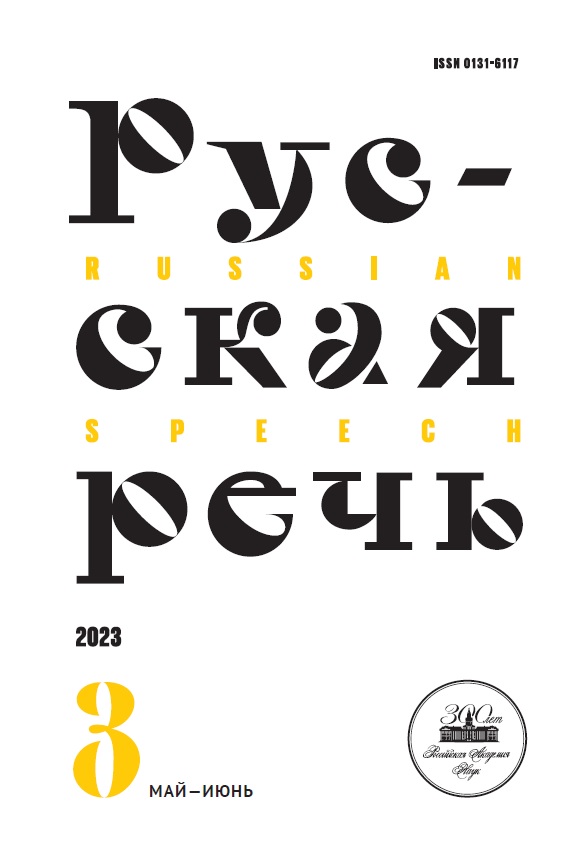Rukoprikladstvo (‘Manhandling’): from ‘Handwritten Signature’ to ‘Beating’
- Authors: Sadova T.S.1, Rudnev D.V.1
-
Affiliations:
- St. Petersburg State University
- Issue: No 3 (2023)
- Pages: 68-79
- Section: Articles
- URL: https://jdigitaldiagnostics.com/0131-6117/article/view/652368
- DOI: https://doi.org/10.31857/S013161170026394-2
- ID: 652368
Full Text
Abstract
The article discusses the history of the semantic transformation of the compound word rukoprikladstvo (‘manhandling’) – from the meaning ‘handwritten signature’ in the business language of Medieval Russia to the meaning ‘beating’ in the modern common Russian language. The word rukoprikladstvo, derived from the stable combination ruku prilozhit (‘set one's hand to’), denoted the symbolic confirmation of an official text by placing a palm, previously smeared with ink, on a blank sheet, the reverse side of the document. The article stresses that the medieval idea of a Russian person about the state as a ‘house’ headed by a ‘father-sovereign’ left a peculiar imprint on the office work of pre-Petrine Russia. Thus, the reliability of the content of a business text was ensured, on the one hand, by the testimony of the closest relatives or respected people of the clan (‘poslukhi’) and on the other hand by the unwritten laws of Christian morality. Since the time of Peter the Great, who was oriented towards Western models of the ‘state machine’, many official formulas have forever moved into the national language, acquiring new meanings motivated by the original semantics of their lexical components. Without a historical digression into the ‘ritual’ features of this obligatory action when sealing a business transaction and, as a result, without considering the functioning of the combination ruku prilozhit' (’put a hand’) in the official writing of pre-Petrine and post-Petrine Russia, it is impossible to trace the meaningful evolution of the word ‘rukoprikladstvo’ to its modern meaning ‘inflict hand beatings’. The history of the expression ruku prilozhit' (‘set one's hand to’) and the word rukoprikladstvo – both in the command language and in common Russian life – testifies to the history of the Russian official language as a separate cultural phenomenon with its own unique destiny.
Full Text
About the authors
Tatiana S. Sadova
St. Petersburg State UniversityRussia, St. Petersburg
Dmitrii V. Rudnev
St. Petersburg State UniversityRussia, St. Petersburg
References
- Большой юридический словарь [Электронный ресурс]. URL: https://gufo.me/dict/law/
- Даль В. И. Толковый словарь живого великорусского языка: в 4 т. М.: Русский язык, 2003. Т. 3. 688 с.
- Евгеньева А. П. (ред.). Словарь русского языка: в 4-х т. М.: Русский язык, 1985–1988. Т. 3. 1987. 751 с.
- Ефремова Т. Ф. Новый словарь русского языка. Толково-словообразовательный. М.: Русский язык, 2000 [Электронный ресурс]. URL: https://lexicography.online/explanatory/efremova
- Кузнецов С. А. (ред.). Большой толковый словарь русского языка. СПб.: Норинт, 2004. 1534 с. [Электронный ресурс]. URL: https://gufo.me/dict/kuznetsov
- Лакиер А. Б. Русская геральдика: в 2 кн. СПб.: В типографии I-го отделения собственной Е. И. В. канцелярии, 1855. Кн. 1. 304 с.
- Молотков А. И. Фразеологический словарь русского языка. М.: Русский язык, 1987. 543 с.
- Мошкова Л. В. Рукоприкладства на грамотах XV – первой трети XVI в. (предварительные наблюдения) // Отечественные архивы. 2015. № 4. С. 12–19.
- Неволин К. А. История российских гражданских законов: в 5 т. СПб.: В тип. Имп. Акад. наук, 1851. Т. 2. 513 с.
- Ожегов С. И. Словарь русского языка. М.: Русский язык, 1990. 917 с.
- Руднев Д. В., Садова Т. С. От челобитной до заявления, или Как формировался язык общения властью (на материале просительных документов XVII–XX вв.) // Язык. Право. Общество / Под ред. О. В. Барабаш, Н. А. Павловой, А. В. Александровой. Пенза: Изд-во ПГУ, 2020. С. 28–32.
- Русанова С. В. Трансформация приказной памяти в условиях преобразования регионального делопроизводства в первой половине XVIII века // Вестник Бурятского гос. ун-та. 2012. № 10. С. 70–74.
- Садова Т. С., Руднев Д. В. Метафора государства и государственный язык // Языковая норма. Виды и проблемы / Ред. Л. А. Вербицкая, С. И. Богданов, С. В. Друговейко-Должанская и др. СПб.: Изд-во РГПУ им. А. И. Герцена, 2018. С. 174–182.
- Словарь русских народных говоров (СРНГ): в 49 вып. Л.; СПб.: Наука, 1965–2016. Вып. 31, 1997. 434 с.
- Ушаков Д. Н. (ред.). Толковый словарь русского языка: в 4 т. М.: Советская энциклопедия, 1935–1940. Т. 3. 1939. 715 с.









